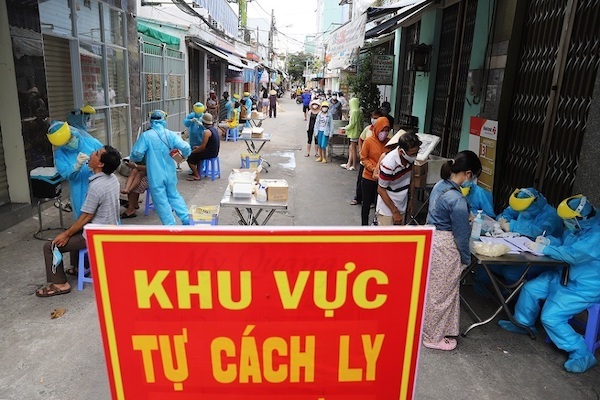VietNamNet presents Dr. Vo Tri Thanh’s article on Vietnamese enterprises' response to the Covid-19 pandemic.
 |
|
The Covid-19 pandemic was unexpected. However, this is an opportunity to challenge the bravery of Vietnam and Vietnamese businesses. Photo: VietNamNet
|
The year 2020 is about to end and the most outstanding thing in the year is the outbreak of the Covid-19 pandemic, which has become a global disaster, and has upset all aspects of socio-economic life. Along with the spread of this disease, the economic impact of the pandemic is very serious. The world economy, which has decelerated since 2019, has witnessed a severe recession in 2020.
It is estimated that global GDP 2020 has decreased to about 4-5%. Unemployment, lower working hours and income reduction have hit hundreds of millions of workers. Many countries have had to resort to unprecedented economic aid packages, in terms of size, coverage, measure and empowerment. There are many risks and uncertainties ahead.
In 2021, the world economy is forecast to have a rather high growth rate, perhaps over 5%, but challenges and difficulties will be great.
Vietnam is a deeply integrated economy, especially with many key investment, trade and tourism partners (such as China, Japan, South Korea, the European Union, the United States...) that are suffering heavily from the pandemic. Vietnam had to struggle hard to fight against COVID-19 and accept “social distancing” at the time of pandemic outbreak (April nationwide, and end of July and August in some provinces).
Vietnam's economy grew only 1.81% in the first half of this year, the lowest level during the Doi Moi (renovation) period.
Due to the resurgence of COVID-19 at the end of July and August, the country’s growth rate could be as low as 2-3% for the whole year. In the first six months of the year, nearly 31 million workers were negatively affected. The figure was about 5 million in August. Covid-19 has adversely affected almost all economic sectors such as tourism, accommodations, entertainment, transportation, logistics, distribution, manufacturing, mining, and even agriculture.
This was a very difficult period for both the economy and local businesses. But the more difficult it is, the more we have to try to maintain the "energy" so that when the epidemic passes, we can rise strongly again.
Like many other countries, Vietnam chooses to combine epidemic prevention, considering this as the most important task, along with efforts to remove difficulties for businesses and support workers to ensure social welfare.
Government's timely response
In conditions in which resources are not abundant and the budget is still tight, the first support package of the Government basically ensures three objectives: practicality; support methods such as debt freezing, tax refunds, and cuts of many types of fees; giving cash to about 20 million people from vulnerable groups. This was unprecedented but still ensured macroeconomic stability.
Along with speeding up public investment disbursement (about $30 billion), the Government still has resources to cope with possible long-term pandemic, when the economy continues to face many difficulties as well as post-epidemic developments.
As mentioned above, the Government issued the first economic assistance package quite promptly, in March-April. However, the policy implementation was still slow and the participation of many agencies was not serious enough and was inconsistent. As a result, the impact of the support package was under expectations and showed many limitations.
New economic stimulus policy
By September, according to a survey by the General Statistics Office, less than 18% of businesses had access to the aid package.
The difficult situation together with the re-outbreak of Covid-19 required new stimulus policies (the second support package). However, it is most important to implement the second aid package in a fast, correct, and transparent manner.
In addition to efforts to help businesses and employees overcome the impact of the pandemic on a large enough scale (even though we have to accept a higher budget deficit and higher public debt ratio), at least for the whole of 2021, the second support package must be associated with the process of economic restructuring, keeping pace with development trends (technology, especially digital transformation; labor skills and new consumption patterns; value chain movement and investment flows…).
The goal is to both reduce difficulties for businesses and create a premise for the next step of sustainable, inclusive and creative development.
In the face of a great shock like the Covid-19 pandemic, the supporting role of the State is very important. But the efforts of the business themselves is still decisive. The problem is not only how to respond to a crisis, but also to recover and break through when the pandemic is over.
 |
|
Many businesses have quickly grasped needs and have changed production and business items. Photo: Le Anh Dung
|
Time for rethinking and governance upgrade
The Covid-19 pandemic was an unexpected incident. However, this is an opportunity to challenge the bravery of Vietnam and Vietnamese businesses. In fact, a lot of business people have faced challenges and overcome difficulties with will, flexibility and creativity such as:
Cost reduction is a very "traditional" measure that many businesses immediately did, depending on the resources of each firm. Calculating the next step and retaining only the most essential part (operations, personnel) is an option. In difficulties, maintaining relationships or understanding partners is also a remarkable aspect.
During the pandemic, social distancing and restricting direct contact has been encouraged. Digital economy, not only e-commerce, but also in education, work ... has had a chance to develop. Many businesses have transformed their business models and methods of customer interactions successfully, thanks to digital technology.
The market has a higher demand for essential goods, no matter how difficult the situation is. Many businesses have quickly grasped the needs and changed production and business items. Medical equipment, face masks, antibacterial hand sanitizers... are the products of this kind. The story about the dragon-fruit bread of a private firm shows human creativity that is suited to market requirements.
Because the different situation of epidemics and epidemic prevention and control in countries, it is very necessary to quickly process information and access the market as soon as possible. For example, when a country successfully controls Covid-19 and begins to ease anti-epidemic measures, businesses should immediately take hold of this opportunity.
Finding information and making effective use of the Government's support packages are also ways to help overcome difficulties. We should not only pay attention to the incentive policy and NOT? forget the promotion of public investment, such as infrastructure, to be able to participate directly or indirectly.
It is also important that businesses should consider the Covid-19 pandemic as an opportunity to turn things around and reform themselves. This is the time of re-thinking, redesigning and rebuilding associated with trend identification; market and partner positioning; determining how to perform digital transformation; improving governance (including risk management); creating new products; and training new skills for employees.
The Covid-19 epidemic occurred when the world economy and Vietnam faced new development trends and ideas such as lifestyles, sustainable and inclusive development, digital world, digital society, digital economy...
Even during the pandemic, more signs of that process have been recognized. There are opportunities and creativity in production and business. It is changing products to suit new market requirements. Business methods also need to change. Digital economy and e-commerce take the throne. The marketing methods, connections between partners, and the market have also changed significantly.
Eight efforts of the business
In a world undergoing profound changes, businesses need to have the following eight efforts:
First, looking for business opportunities associated with the market, with international integration, especially with free trade agreements (FTAs) (such as AEC; CPTPP; EVFTA…) that Vietnam has joined.
Second, joining the value chain and the global production network based on connections, selecting effective partners and the spirit of "win-win".
Third, moving with the fourth industrial revolution and especially digital transformation.
Fourth, learn and know how to raise capital in a diverse, complex and sophisticated financial market.
Fifth, making dialogue and conduct according to law, ensuring business contracts and protecting the interests of businesses and employees.
Sixth, building brands and demonstrating corporate social responsibility.
Seventh, have dialogue with the Government, ministries, to contribute to improving policies and business investment environment.
Eighth, learn and apply how to manage uncertainty and risks well.
In short, businesses need to restructure on the basis of recognizing trends, bringing into play their advantage, creativity, wise connections and risk management.
Noted by Lan Anh

Covid-19 crisis leads to lower incomes, living conditions for tens of thousands of families
Surveys all show that the living conditions of many Vietnamese have become worse because of Covid-19. However, economists are not recommending a second support package.